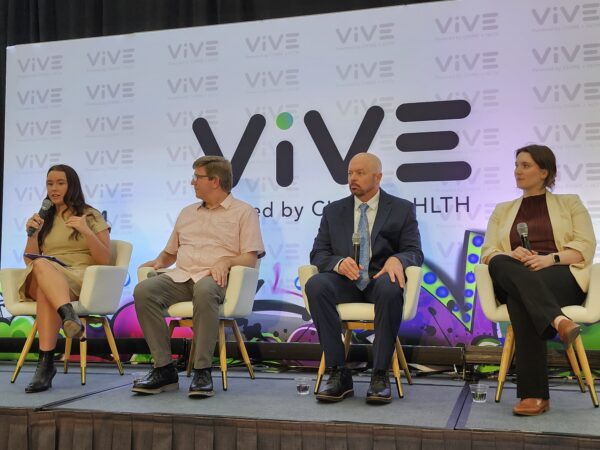

Women-led startups that received funding rose to 18 percent in 2014 compared with a little more than 9 percent in 2009, according to data from CrunchBase. The growth of women in leadership roles is part of an upward trend but some groups are keen to do more. CSweetener is a new not-for-profit business that seeks to improve those figures by pairing women healthcare entrepreneurs with both male and female mentors who can share their insights to increase the number of women in the C-suite.
Lisa Suennen founded the not-for-profit company, which will officially launch at the MedTech Vision Conference today. Suennen advises healthcare startups and authors healthcare blog, Venture Valkyrie. She developed the idea as part of her Aspen Institute Health Innovation Fellowship, which required her “to dream up and start a venture to advance the leadership of innovators in healthcare,” according to her latest blog post. She also receives about five to six emails each week from women entrepreneurs seeking her advice and support, proving to her there is a significant demand for this service.
CSweetener received backing from GE Ventures and Grand Rounds, according to the startup’s website. In response to emailed questions, Suennen offered her perspective on the needs her business seeks to address.
“We are focused specifically on healthcare because it is an industry where women are so profoundly influential as purchasers, decision-makers and caregivers but so under-represented as executives and business leaders. We will have both business/operations and clinical/scientific tracks, as the career pathways are quite different but both essential to moving the field forward. We feel it essential that women across all aspects of healthcare find value here, whether they are from medtech, pharma, healthIT, health services – they are all interrelated fields anyway.”
Asked to offer some examples of how mentors would support entrepreneurs, Suennen noted that mentors would provide guidance on how to tackle challenges of leadership broadly, from how to get ahead, how to navigate tricky situations or how to gain new skills.
“In my own experience, I have found that you can make a real difference as a mentor by listening, providing advice from a place of experience, and especially providing a safe haven for asking questions and brainstorming and seeking honest feedback.”

Health Benefit Consultants, Share Your Expert Insights in Our Survey
Share some of the trends you are seeing among your clients across healthcare, including chronic conditions, behavioral health, healthcare navigation, and more.
In an effort to prevent the program from descending into startup pitching bedlam, Suennen emphasized that entrepreneurs taking part in the program are prohibited from seeking funding or selling to mentors. The idea is to maintain a “a true collegial experience that gives both parties a positive sense of accomplishment.”
CSweetener’s short-term goal is to have a successful beta in the Bay Area in the first quarter of 2017, but the company aspires to set up a national program serving women well that also delivers a tangible impact.
Although there are groups that provide investment to women-led companies such as the 11 year-old investment firm Golden Seeds and more multi-pronged support for women leaders such as the 20 year-old Alliance of Women Entrepreneurs, mentoring programs targeted at women entrepreneurs are part of a growing trend in general.
One big challenge is that many women-led businesses simply fail to get the necessary funding. Ethan Mollick, an assistant professor of management at Wharton School of Business at University of Pennsylvania, called attention to this vexing problem in an article on the business school’s blog.
“We know that about 38% of new businesses in this country are started by women but only between 2% and 6% of those founders receive VC funding,” he said.
In the same article, Wharton Assistant Professor of Management Laura Huang identified access to valuable business support as one problem women entrepreneurs grapple with but added that gender bias remains an issue.
“In the context of entrepreneurship, there is so little objective data to go on in the early stages of a venture [that it] makes it easier [for VCs] to be influenced, whether implicitly or explicitly, and make judgments based on personal attributes like gender.”
Source: Bigstock Photos














